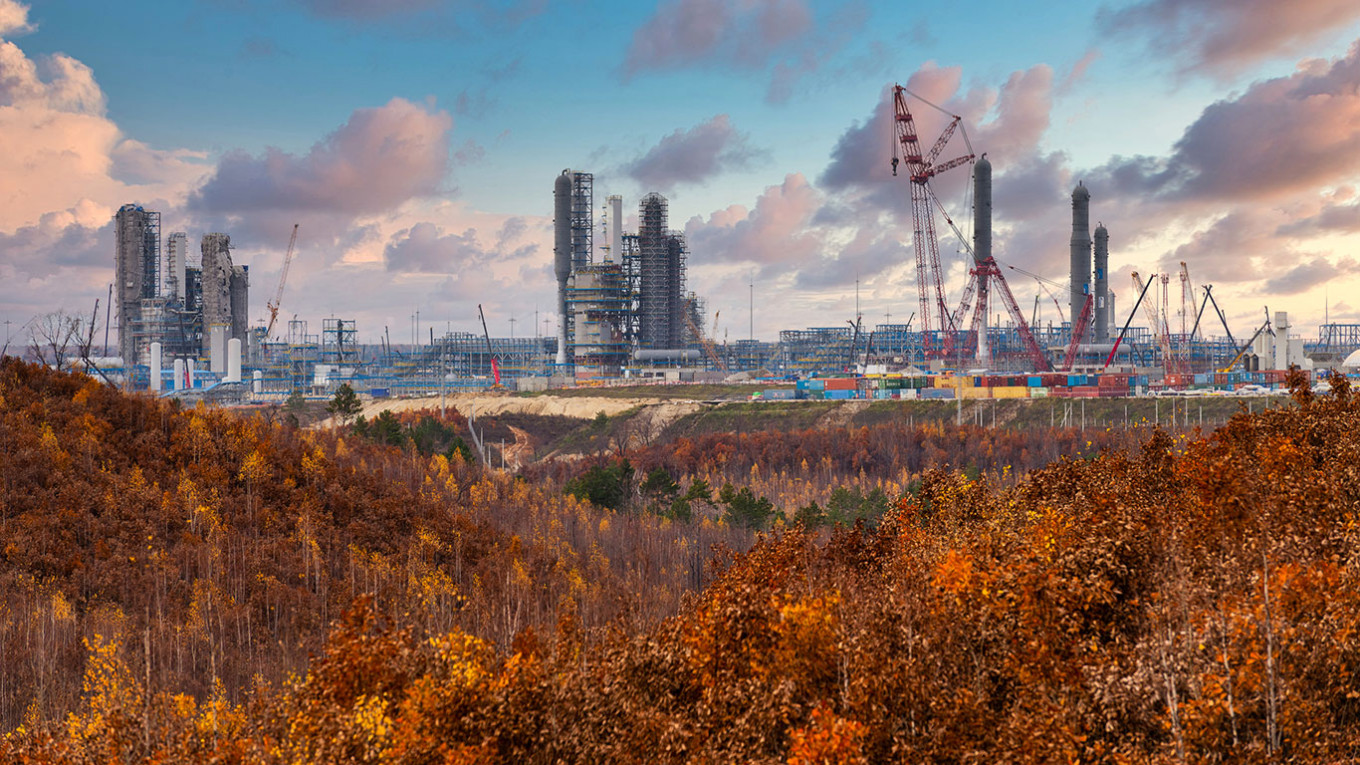The COP26 summit on climate change in Glasgow was an attempt to write global climate rules with which everyone — or almost everyone — will agree. The fight against global warming is also an opportunity for the West to restore its global leadership, since it is closest to the green economy and willing to go ahead and then lead others down this path.
Opponents of the West, including Russia and China, suspect the West of planning to turn its own interests into universal rules for everyone else. The West, meanwhile, suspects this will be yet another area in which its adversaries will break the rules, create obstacles, and undermine its authority, or at the very least merely feign participation in the common cause.
For Russian President Vladimir Putin himself, calls to cooperate against a common threat despite existing disagreements are a favorite instrument in his foreign policy toolbox. To him, the climate agenda, like any other, is also a question of national security and sovereignty.
Just as it has in so many other spheres, Moscow has put a security spin on the subject of climate change, which means that it only really takes seriously climate issues that pose a direct threat to Russia.
First and foremost, that is global warming. Emergency response teams have been fighting fires and managing floods far more in recent years than ever before. While melting ice caps will make the Northern Sea Route more accessible, the warmer Russian North may become even less inhabited as permafrost turns into swamps stretching for thousands of miles.
The thaw may bring ancient viruses back to life, while in the Arctic, the vanishing ice will wipe out polar bears.
A warmer climate is also a threat to the Russian economy. Western states are promising to do away with Russia’s main exports — hydrocarbons — and are inclined to force others to do the same, such as by taxing any goods they don’t consider to be sufficiently green.
The threat Russia is facing, therefore, is twofold: it stands to lose from global warming, as well as from measures to combat it if they run counter to Russian interests. But any threat is also an opportunity: by promptly joining the green transition, Russia may also gain from it, since it possesses the necessary resources and technologies. To enable that to happen, the rules of the green transition must take into account Russia’s interests.
This battle on two fronts is where the Russian siloviki, or security services, and the technocrat economists in the government can find common ground. The most effective way to diminish the risks of the global anti-carbon march is to join it as one of its organizers.
This is how Putin usually operates when he wants to start cooperating with the West. Without yielding to Western demands, he offers cooperation against a powerful common enemy, whether that is Islamic terrorism, Somali pirates, Iranian missiles, ISIS, COVID-19, or environmental problems. After all, isn’t that precisely how Moscow and its Western allies built an international rules-based world order against a mutual enemy three-quarters of a century ago during World War II?
Experience has shown that the West is increasingly reluctant to accept Russia’s offers to cooperate. It believes that the most effective thing that Russia can do to help is to change itself. When it comes to the climate issue, however, Russia’s call to unite against the common enemy sounds more convincing.
It may be possible to dispense with Russia in the fields of political institutions, new technologies, or global finance, but it’s impossible to combat climate change without Russia’s help.
If the West is looking for easily accessible avenues of pragmatic cooperation with Russia, the climate issue is a good choice. This is a field in which the West won’t be blamed for compromising.
Hence, the West sees two options: it may use the climate issue to engage in a constructive dialogue, free from the burden of the ongoing hybrid war, or it can extend the hybrid war to environmental issues and start lecturing and condemning Russia from the ecological pulpit.
The West may be tempted to blame Russia and China for the failure to improve the climate situation: after all, if they’re indispensable in effecting positive change, and there are no positive changes in sight, then it must be primarily their fault.
Indeed, Putin and the Chinese leader Xi Jinping have already been criticized for missing such an important global event. Russia sent one of the biggest delegations to Glasgow, but Putin’s absence meant that Russia was kept out of the summit-level negotiations, where presidents and prime ministers met offline.
That appears to be in keeping with Russia’s design. It wants to sit at the same negotiating table with Western nations and other countries and observe the decisionmaking process from the inside, without taking on excessive commitments. The lower delegation status was one way to avoid signing the summit pledges: legally nonbinding promises on various climate issues.
Dozens of countries signed the Global Methane Pledge to slash emissions by 30 percent by 2030, a pledge to increase production of near-zero emissions steel by 2030, and a third pledge to stop using coal in energy production. Russia, for its part, only signed the forest pledge, a commitment to end and reverse deforestation by 2030, in which no figures are specified.
Russia, it appears, wants to advance its own green agenda, but is not prepared to accept anyone else’s objectives. This is why Russia wants the managed absorption of methane emissions by forests to be counted as emissions reduction. It is also why Russia wants nuclear energy to be classified as green, and why Russia is negotiating a way to define carbon credits that could be exchanged and sold by countries.
The Russian agenda differs from the global one as defined by the organizers of COP26 in two ways. First, for Russia, ecological problems overshadow climate issues. Second, Russia’s planning horizons are much shorter than those of the summit’s organizers.
Russia’s ecological and climate goals are somewhat closer to those of developing countries — some might say insufficiently ambitious — such as raising the energy efficiency of municipal infrastructure, switching urban and rural boiler rooms and entire thermal power stations from coal and wood to gas, and organizing garbage recycling. These problems may have been discussed by summit participants, but it’s hard to make newsworthy pledges out of them.
As to the sustainable future, domestic instability makes it impossible for developing countries to plan for even a couple of decades ahead, let alone for a hundred years. Everyone remembers how the plans that the Russian elite formulated in the 1980s lost all relevance in the 1990s, with the same pattern repeating itself in the following decades.
Articles by and interviews with senior Russian figures reveal a focus more on ecology in its classical sense than on some futuristic understanding of climate change. They talk more about the energy transition and related risks and opportunities for Russia than about global warming and reductions in methane emissions.
Still, everything is related, and Russia does not oppose the global agenda. As in every other area, while trying to maintain its dignity and sovereignty, it seeks to formulate its own position in conjunction with the global one.
This creates a dilemma for the summit’s Western organizers: they may say that Russia is again confronting the rules-based world order, or they can include Russia’s green agenda in their own. Ultimately, it won’t be possible to cool down today’s overheated world without countries like Russia and China.
This article was first published by the Carnegie Moscow Center.
This article was published as part of the “Relaunching U.S.-Russia Dialogue on Global Challenges: The Role of the Next Generation” project, implemented in cooperation with the U.S. Embassy to Russia.
A Message from The Moscow Times:
Dear readers,
We are facing unprecedented challenges. Russia's Prosecutor General's Office has designated The Moscow Times as an "undesirable" organization, criminalizing our work and putting our staff at risk of prosecution. This follows our earlier unjust labeling as a "foreign agent."
These actions are direct attempts to silence independent journalism in Russia. The authorities claim our work "discredits the decisions of the Russian leadership." We see things differently: we strive to provide accurate, unbiased reporting on Russia.
We, the journalists of The Moscow Times, refuse to be silenced. But to continue our work, we need your help.
Your support, no matter how small, makes a world of difference. If you can, please support us monthly starting from just $2. It's quick to set up, and every contribution makes a significant impact.
By supporting The Moscow Times, you're defending open, independent journalism in the face of repression. Thank you for standing with us.
Remind me later.








